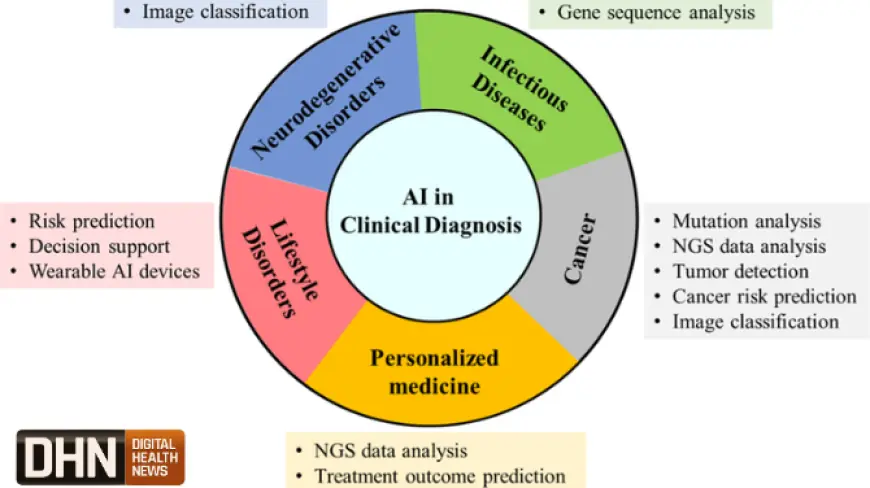The Role of AI in Diagnosing Diseases: Opportunities and Challenges
AI is revolutionizing disease diagnosis by offering early detection, faster analysis, and enhanced accuracy. However, challenges such as data privacy, bias, and regulatory hurdles must be addressed to ensure responsible and effective AI implementation. As digital health technology advances,
Artificial Intelligence (AI) is transforming the landscape of healthcare, particularly in disease diagnosis. By leveraging machine learning algorithms and big data, AI is helping doctors detect diseases faster and more accurately than ever before. From cancer screenings to early detection of neurological disorders, AI-powered diagnostics are revolutionizing patient care and improving health outcomes. However, while AI presents significant opportunities, it also comes with challenges that must be addressed to ensure its effectiveness and ethical implementation.
Opportunities of AI in Disease Diagnosis
1. Early and Accurate Detection

AI can analyze vast amounts of medical data, including imaging scans, genetic information, and patient histories, to detect diseases at an early stage. For instance, AI-powered imaging tools can identify cancerous cells in radiology scans with higher precision than traditional methods, enabling early intervention and better survival rates.
2. Faster Diagnostic Processes
Traditional diagnostic methods often require extensive testing and time-consuming analyses. AI significantly speeds up this process by quickly analyzing test results, reducing the time it takes to diagnose conditions such as cardiovascular diseases, diabetes, and infections.
3. Enhanced Radiology and Medical Imaging
AI-driven radiology tools can detect anomalies in X-rays, MRIs, and CT scans with remarkable accuracy. Technologies like deep learning enable AI models to differentiate between normal and abnormal images, assisting radiologists in diagnosing diseases like lung cancer, stroke, and fractures with greater efficiency.
4. Personalized Medicine
AI enables precision medicine by analyzing patient-specific data to tailor treatment plans. By studying genetic markers and lifestyle factors, AI can help predict how a patient will respond to certain treatments, leading to more effective and customized healthcare solutions.
5. Reducing Human Errors
Medical errors, including misdiagnoses, can have severe consequences. AI acts as a second opinion for healthcare providers, minimizing the chances of oversight or misinterpretation of medical data, thus improving diagnostic accuracy.
Challenges in AI-Based Disease Diagnosis
1. Data Privacy and Security Concerns
AI systems rely on vast amounts of patient data to function effectively. Ensuring data privacy, security, and compliance with regulations like HIPAA and GDPR is crucial to prevent unauthorized access and data breaches.
2. Bias in AI Algorithms
AI models are only as good as the data they are trained on. If the dataset lacks diversity, it can lead to biased diagnoses, disproportionately affecting certain demographic groups. Addressing bias in AI healthcare models is essential for equitable patient care.
3. Regulatory and Ethical Considerations
The adoption of AI in medical diagnosis raises ethical concerns, such as the responsibility of AI-driven decisions and the need for human oversight. Regulatory frameworks must evolve to ensure AI is used safely and effectively in clinical settings.
4. Integration with Existing Healthcare Systems
Many healthcare facilities operate on legacy systems that may not be compatible with AI-based solutions. Integrating AI into existing workflows requires significant investment and training for medical professionals.
5. Trust and Acceptance Among Medical Professionals
Some healthcare providers may be skeptical about AI-driven diagnostics, fearing job displacement or questioning the reliability of AI predictions. Building trust through transparent AI development and clinical validation is necessary for widespread adoption.
Future of AI in Disease Diagnosis
As AI technology continues to evolve, its role in disease diagnosis will expand further. Future developments may include:
-
AI-powered wearable devices for real-time health monitoring
-
More sophisticated predictive analytics for disease prevention
-
AI-assisted robotic surgeries for precision treatment
Conclusion
AI is revolutionizing disease diagnosis by offering early detection, faster analysis, and enhanced accuracy. However, challenges such as data privacy, bias, and regulatory hurdles must be addressed to ensure responsible and effective AI implementation. As digital health technology advances, AI will continue to shape the future of healthcare, improving patient outcomes and redefining the diagnostic process.
What's Your Reaction?
 Like
0
Like
0
 Dislike
0
Dislike
0
 Love
0
Love
0
 Funny
0
Funny
0
 Angry
0
Angry
0
 Sad
0
Sad
0
 Wow
0
Wow
0



















































